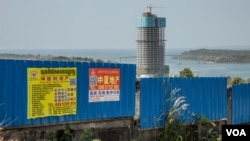Singapore. Las Vegas. Silicon Valley. These are the models the Cambodian government says it is hoping to emulate in the coastal port city of Sihanoukville, now awash in Chinese investment.
Government spokesman Phay Siphan on Monday gave a nearly two-hour press conference to drill the message home to reporters from a pulpit at the Council of Ministers building, itself build with Chinese money.
Public discontent over massive Chinese investment and associated immigration to Sihanoukville is rising, as billions of dollars pour into the real estate market and casinos spring up seemingly overnight to cater to Chinese tourists.
“You know what?” Siphan said at the meeting on Monday. “It has only been eight months since my last visit [to Preah Sihanouk province] and I went there again and I got lost, it changed quite fast from my memory of the [city’s] old landscape.”
“I traveled around the city’s streets at night, it was just a picture of Las Vegas,” he added.
Sooner or later, Siphan says, the region will be transformed into a financial and tech hubs like Silicon Valley or Singapore, he insists, calling on the media to write “positive” articles about the “developmental phenomenon”.
Sihanoukville “is a city of development with a desire to be a modern city which I would call a city of miracles that we should be proud of as Khmer,” he said.
“I cannot imagine if [Sihanoukville] can be the next Silicon Valley in California as a tech hub, but I think it may be on the way to be one.”
Sihanoukville’s rapid transformation comes amid a global push back against China’s Belt and Road Initiative, with growing concern Beijing is practicing “debt-trap diplomacy”.
Cambodia has grown closer to China as relations with Europe and the United States continue to sour over Prime Minister Hun Sen’s human rights record and the dissolution of the country’s main opposition party ahead of elections last year.
Claims were made that China was planning to turn a port being built by one of its state-owned companies in Koh Kong into a naval base have been roundly denied. Siphan called such claims a “smear campaign”.
Chinese tourists made up one-third of the 6.2 million visitors to Cambodia last year. In Sihanoukville, some 90 percent of the permanent expatriate community are Chinese, according to officials.
The influx of immigrants and finance follows a visit to Cambodia in October 2016 by Xi Jinping, the Chinese president.
Meas Ny, a political analyst in Cambodia, said large-scale Chinese investment came with benefits, but also put the country’s independence at risk.
“With most development projects run by Chinese, social dialogue usually does not happen. They don’t care to ask about local concerns until huge impacts take place—and they solve it later.”









